Obtained by pressing olives and extracting the oil, olive oil is a well-known ingredient present in almost every kitchen.
However, if you happen to run out, there are substitutes for olive oil that can give your dishes their own touch and alteration. To understand their differences, you should know what olive oil offers.
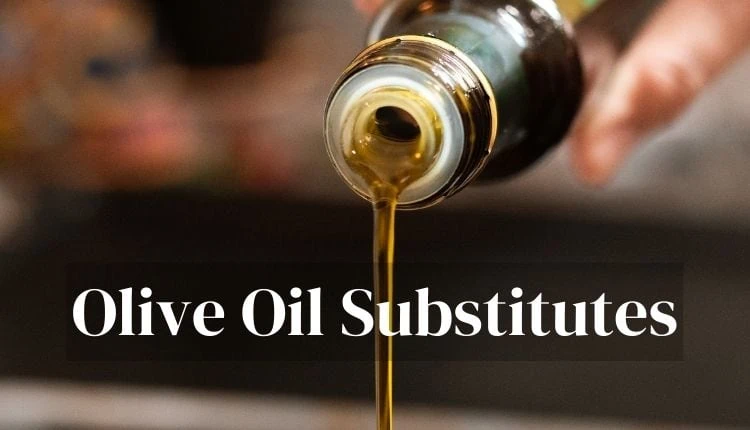
This oil has multiple flavor profiles depending on the harvest time. You can get earthy, nutty, and fruity notes which may be subtle or intense.
The versatility and health benefits of olive oil make it distinctive and popular.
In this article, we will be discussing 15 substitutes for olive oil. You’ll get to know how they will influence your recipe’s flavor, their benefits and health risks, and what dish you should use them for.
1. Almond Oil
Almond oil is a healthy substitute for Olive oil. It’s keto-friendly, anti-inflammatory, and heart-healthy.
This substitute is also rich in Vitamin E, Magnesium, Calcium, and Iron. The main difference between olive oil and almond oil is the taste.
Unlike olive oil’s bitter notes, Almond oil has a robust, nutty, and sweet flavor.
There are no trans fats in almond oil, however, it’s high in saturated fats and calories, so it’s not the best alternative for those trying to lose weight. 100g of almond oil contains about 884 calories (kcal).
This oil is best used for baking but can also be used for pasta and salad dressing.
2. Canola Oil
You get canola oil by pressing rapeseeds. It is a good, mild-flavored substitute for olive oil.
This will be the perfect alternative if you don’t want your oil to overpower a recipe with its flavor. Plus, it’s also widely available since it’s easy to make.
Regarding nutritional value, canola oil reduces cardiovascular risk factors and cholesterol. Just like Almond oil, this alternative doesn’t contain trans fat.
However, it’s not as healthy as olive oil.
You can use canola oil for sauteing, grilling, baking, and cooking but it’s best used for fat frying. You can also use this substitute to top salads and make sauces.
3. Vegetable Oil
Like canola oil, vegetable oil is a neutral and widely used alternative. This substitute is made from soybeans, sunflower, and canola.
While it does get the job done, it’s not the healthiest option because harsh chemicals, including trans fats, are added to it to make it last longer. The processing also reduces the number of healthy micronutrients and plant compounds present in the ingredients.
It’s primarily used in cooking and baking. If you’re considering using this for salad dressing, you may want to turn to a different substitute.
4. Avocado Oil
Cold-pressing avocados make avocado oil. This is a popular option among cooking oils since it has a light flavor and high smoke point.
The benefits of this substitute for olive oil include:
- Sooting dry or irritated skin.
- Producing connective tissue.
- Lowering blood sugar levels and bad LDL cholesterol.
You can choose between extra virgin and refined avocado oil like olive oil. The extra virgin option is better since it offers more benefits than the alternative.
It also has a better buttery and fatty flavor. By checking the color, you can differentiate between refined and extra virgin avocado oil.
The extra virgin option is green, while yellow oil indicates that it has been refined.
5. Coconut Oil
One of the most popular choices of olive oil substitutes is coconut oil.
It is a delicious, vegan option, best used in high-heat cooking, but the benefits aren’t limited to this. This oil can help increase good cholesterol, control blood sugar, and reduce stress.
However, in terms of the downside, this option is high in saturated fat. There are claims that coconut oil doesn’t contribute to body fat storage, but there isn’t enough research to confirm this theory.
Also, remember that since coconut oil has a solid state at room temperature, it can’t work with salads or marinades. It’s best to use it with curry dishes, cookies, cakes, and biscuits instead.
6. Flaxseed Oil
Flaxseed oil is made when flax seeds are pressed, and the solid mash is removed. Compared to olive oil, flaxseed is lower in mono-saturated fats but contains omega-3 fatty acids, omega-6 fatty acids, and short-chain and medium-chain fatty acids.
Flaxseed oil has a mild nutty flavor and a lower smoke point (225 degrees Fahrenheit) than olive oil (320-468 degrees Fahrenheit). This makes the substitute more suitable for salad dressings, marinades, and dips than cooking or baking.
Another con of this alternative is that it can increase cholesterol levels.
7. Grapeseed Oil
Made by pressing grapeseeds, this substitute for olive oil is versatile.
Since it has a light flavor, it won’t overpower your dish. You can use it for sauteing, baking, and even roasting. It’s best with flavorful ingredients such as vegetables.
Grapeseed oil works great as a salad dressing as well. The best thing about this alternative is that it has the same fat profile as olive oil, so you won’t have to alter the recipe ingredients.
It’s also rich in Vitamin E and antioxidants and reduces the risk of heart attacks.
8. Peanut Oil
Another light-flavored olive oil alternative is peanut oil.
It has a subtle flavor that works well with several dishes. This alternative doesn’t have cholesterol and is great for cooking at high temperatures.
It’s best for baking, frying, curries, and dressings. It is rich in Vitamin E, and you can get it at a lower cost than olive oil.
However, similar to vegetable oil, peanut oil contains chemicals that can result in allergies.
9. Sunflower Oil
This substitute is made from the pressed seed of sunflower. Good quality sunflower oil is rich in oleic acid and Vitamin E.
However, this is not a keto-friendly option since it’s high in trans fats, which can cause inflammation leading to stroke, heart attack, and diabetes.
However, if used in controlled quantities, this oil can have its benefits, such as improved skin health. For this, you need to ensure that you get a premium brand since cheaper versions may be lacking in terms of nutrients.
Sunflower oil has a light flavor, making it ideal for sauteing, baking, cooking, and frying. You can also use it in salads.
10. Walnut Oil
Walnut oil is made using crushed walnuts. This oil is rich in antioxidants and can decrease inflammation, help control weight, and lower blood pressure.
It has a subtle nutty taste which can turn bitter when heated. This substitute is a good source of poly and mono-saturated fats.
Since you wouldn’t want to end up with bitter notes in your food, it’s best to keep walnut oil away from the stove. It’s best to use it on salads.
11. Butter
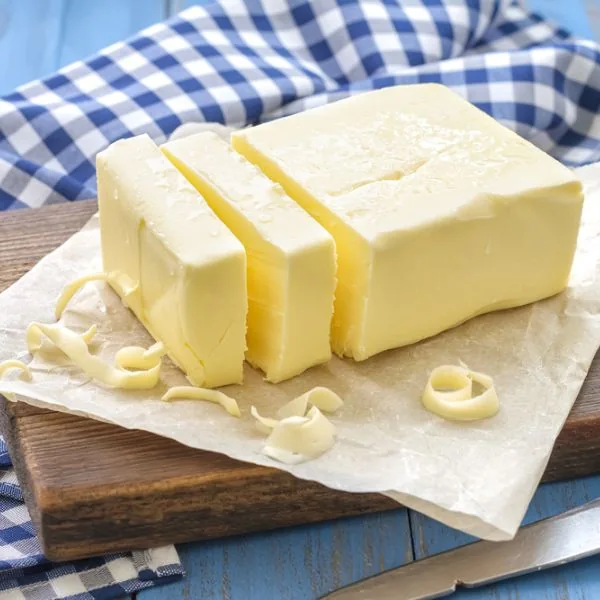
Butter is another popular choice for cooking. It’s made from saturated fat, which can increase LDL ‘bad’ cholesterol and increase the risk of heart diseases.
It also has a lower smoke point than olive oil, which can cause it to burn easier. However, if you mix olive oil and butter, you can get great results.
This won’t act as a substitute, but it will give depth to your dishes as butter adds more flavor, and olive oil keeps the butter from burning.
You can use butter for cooking, baking, and grilling. It’s best not to add butter to your dishes in high amounts since it doesn’t contain the same nutrients as olive oil and can damage your health instead.
12. Ghee
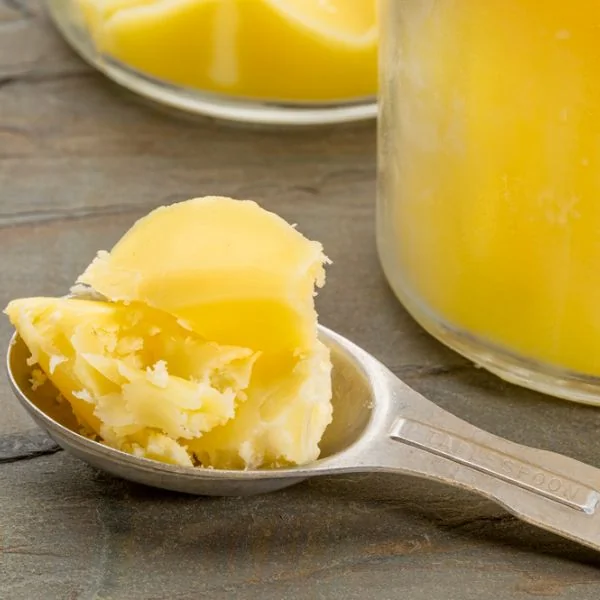
A staple of some South Asian countries, Ghee is prepared by heating butter until the water reduces and the milk solids turn brown.
This results in a rich butter oil with a nutty flavor. It adds a creamy, rich butteriness to the food you won’t get from cooking oil or butter.
Coming to benefits, Ghee is a rich source of Vitamin A, Vitamin C, Vitamin D, and Vitamin K.
It contains healthy fats, helps the digestive system, and improves your immune system. It’s also gluten-free, making it one of the healthiest options out there.
However, it does increase cholesterol levels, so it’s best to use it in controlled amounts.
13. Mashed Banana
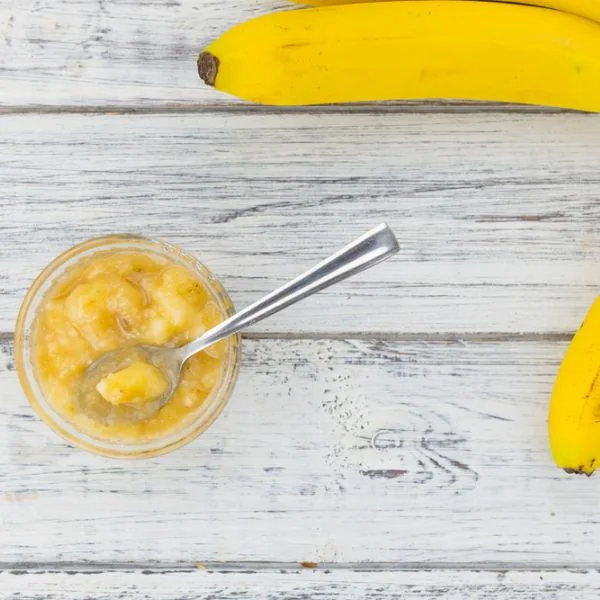
This seems like an odd one, but hear us out! While mashed bananas don’t offer the same versatility as most of the other options on our list, they can work well in baking. Aside from being full of potassium, bananas are also fat-free.
It’s best to use ripened bananas to substitute for olive oil. You can peel, mash and freeze your bananas in ice trays for the future.
When ready to use them, simply take them out and allow them to thaw.
14. Argan Oil
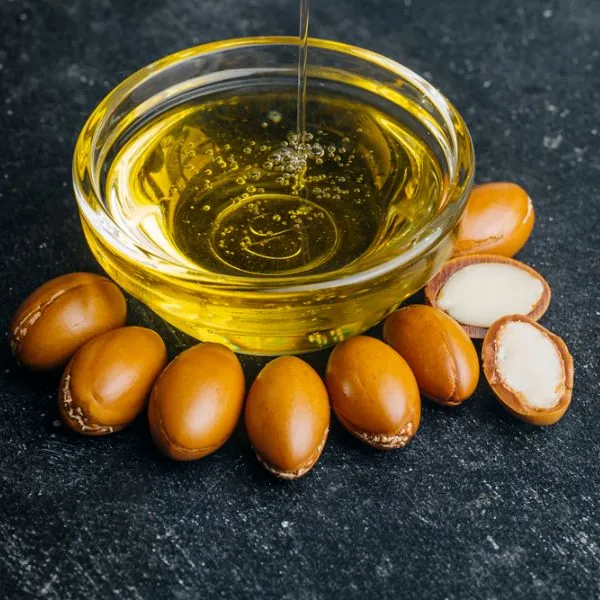
Argan oil is a plant-based oil produced from the kernels of the Argan tree. It has a nutty, toasted flavor and has a lower smoke point than olive oil.
So, you can’t use this to cook at a high temperature, but it’s great for pan frying at medium heat. You can use it for salad dressings, sauces, pastries, biscuits, grilled fish, brownies, and spreads.
Even though argan oil has the same health benefits as olive oil, it also has a higher amount of omega-3 fatty acids, and it’s richer in vitamin E.
15. Soybean Oil
Soybean oil is obtained from cultivated soybean seeds, well-known for being a rich source of proteins.
This substitute is higher in mono-saturated acids compared to olive oil. It’s also lower in saturated and trans fats.
Besides being versatile due to its neutral flavor, soybean oil has a higher smoke point than other alternatives. You can use it for cooking, baking salad dressings, and even frozen foods.
Conclusion
You can use different substitutes for olive oil, depending on what you want to use them for. Oils with low smoke points are best for salads and sauces, while the ones with higher smoke points can be used for cooking, grilling, and baking.
Alternatives that are solid at room temperature cannot be used with salads, so you’ll have to use them for recipes that require heat.



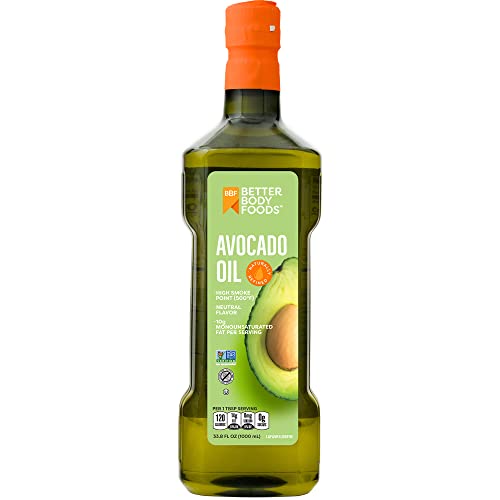





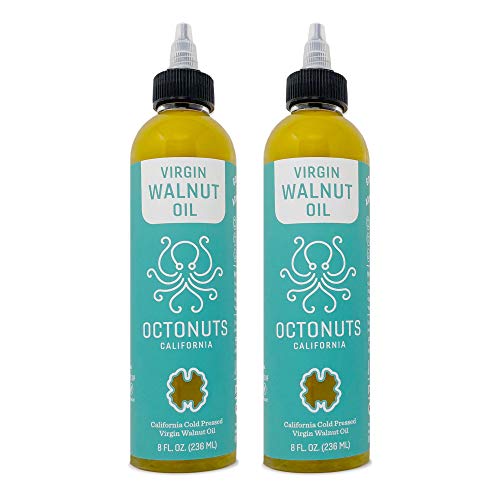






Adeena is a freelance content writer and cooking enthusiast from Pakistan. She is currently a business student, and when she wants a break from her studies, writing on her favorite topics and cooking yummy dishes are her favorite things to do.